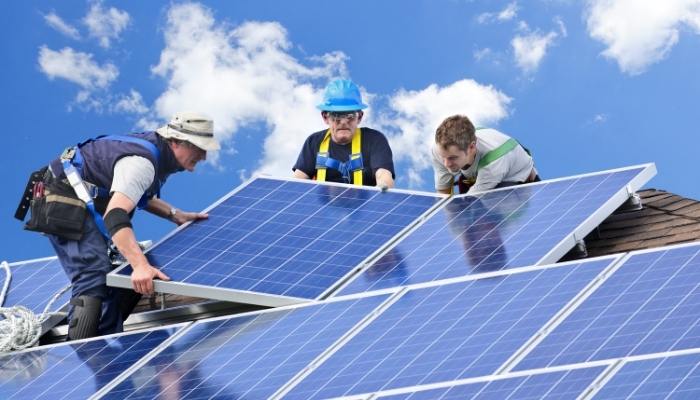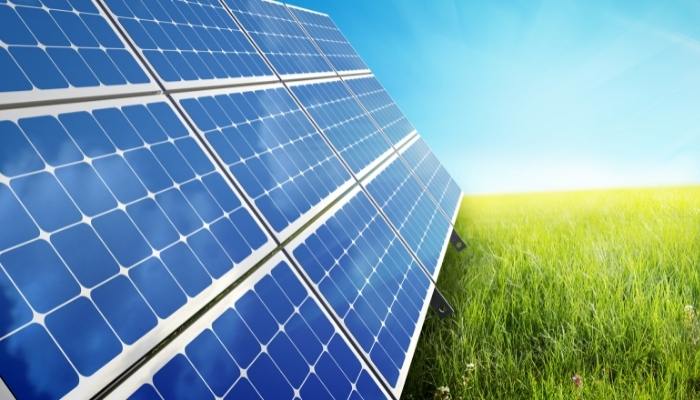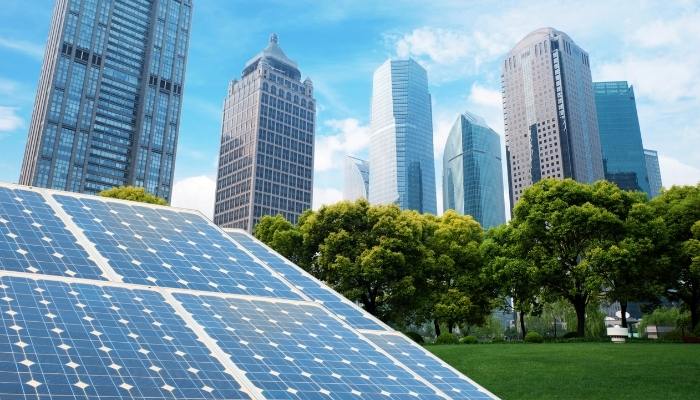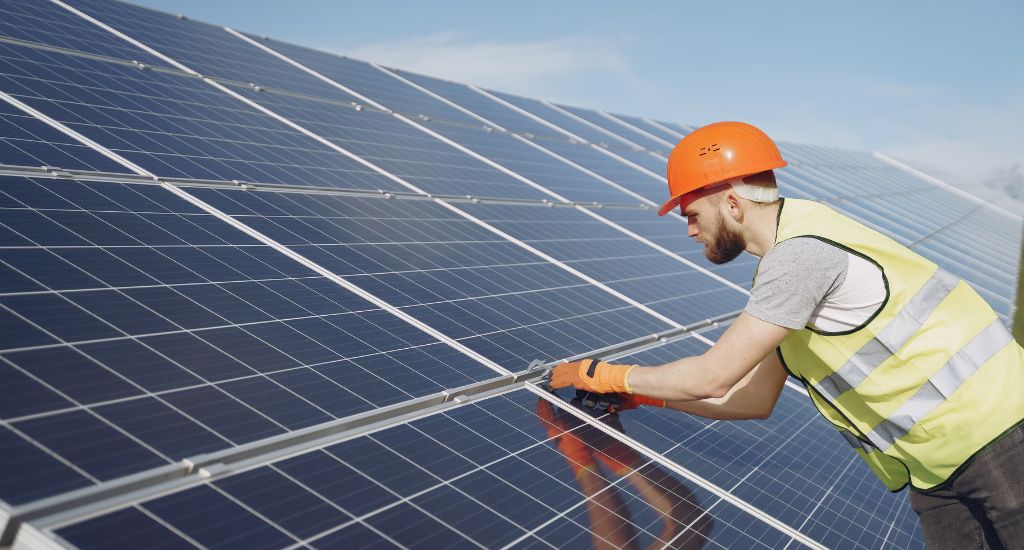Are Solar Panels Worth It In Alberta?
Is it worth it to install solar panels on your building in Alberta?
The Short answer is yes, it is worth installing solar panels in Alberta. The amount of sunlight in Alberta is high enough to make the cost of installation and the cost of maintenance worth it for the long-term energy savings and environmental impact.
Green Energy and Seko Construction
Solar energy and other alternative energy sources are the way of the future. Seko Construction works with large-scale building projects which have significant opportunities for green energy implementation, especially solar. If you are starting a building project or retrofitting a commercial/industrial building we would love to speak with you about the opportunities and advantages you have in green energy solutions.
Fill in the form below and we will be in touch.
Is Solar Right For Your Project?
If you are in Alberta they very well could be, however, there are a few things that need to be considered when you are contemplating the integration of solar panels in Alberta.
Unlike some other energy sources, solar energy is dependent upon the weather. It also involves more installation– which comes with a price tag– than more commonly used energy, like electricity or fossil fuels. You will want to do thorough research on this before you make any final decisions.
Take a look below for more details on solar panels and solar energy systems, and whether they are a good choice in Alberta.
What Are Solar Panels?
You may be wondering exactly what solar panels are, in the first place. Solar panels are also referred to as solar PV systems or photovoltaic panels, so if you see these terms, you know that they are referring to the same thing. The solar pv system is made up of individual cells, which are constructed from layers of semiconducting material. Typically, the material used here is silicon. When light is shone on the panels, it creates a flow of electricity which helps to create power that can be used for your business needs.
Additional Resources – What is Design-Build Construction?
Additional Resources – Seko Construction Calgary Page
Also Read – Are Solar Panels Worth it in BC?
Also Read – Looking for EV Chargers for our Building?
How Do Solar Panels Work?
As mentioned above, solar panels generate energy from the sunlight that shines onto the panels themselves. The panels create direct current, or DC energy. However, both households and businesses use alternating current, or AC, electricity. Due to this, a solar energy system also needs an inverter. The inverter will work to convert the DC energy that is generated into AC energy that is usable in your business. Each solar panel is able to create about 200 to 350 W of energy when in direct sunlight. Of course, the energy output may fluctuate depending on the weather conditions.

Types of Solar Panels
It is important to be aware of the type of solar panel that you will be installing for your business. There are several different kinds, but the two most common types of solar panels are known as monocrystalline and polycrystalline. We will go over both in more depth below.
Monocrystalline
The first type of solar panel is monocrystalline. Monocrystalline solar panels are the purest form of solar panel. They are characterized by their dark colour and rounded edges. They are made from a large, singular block of silicon that is cut into wafer formats. Due to the high purity of the monocrystalline solar panels, they are some of the most highly efficient options. They are also less affected by the weather than some of the other kinds of solar panels. However, monocrystalline solar panels are also the most expensive of the solar panel options.

Polycrystalline
Polycrystalline solar panels are the other main type of solar panel. They are created by melting raw silicon. This is a faster process than the process of making monocrystalline solar panels. It is also cheaper, too! These types of solar panels are recognizable by their blue speckled appearance.
Polycrystalline solar panels are still very efficient, but not quite as efficient as monocrystalline solar panels are. They also have a resistance to high temperatures, so they are able to generate more power and electricity throughout the year. As the process to make polycrystalline is not as involved, they are a less expensive solar panel option than monocrystalline solar panels. However, this type of solar panel also has a lower efficiency rating, and are more likely to have a shorter lifespan than monocrystalline solar panels. This is because they can be more sensitive to higher temperatures, to a greater degree– even though they are more temperature tolerant.

Why Should a Business Use Solar Power?
There are many great reasons that you should use a solar power system for your business! One big reason is that it helps to cut down on your business’ energy costs, of course. This is usually the top reason that people turn to using a solar power system. It also helps you to cut your carbon emissions, which means that you are helping to fight climate change, rather than contributing to the problem. Another perk of using a solar power system is that it can help you to protect yourself and your business from electricity price surges, no matter the time of the year or other extenuating circumstances. It reduces your reliance on the retail electricity suppliers that are available in your area.
There are also many commercial tax incentives on solar power for Alberta businesses, which you can look into to see if any of these will apply for you. This can be an added benefit for you, in addition to all of the great advantages that we have already outlined. There are also net metering systems that allow you to get credit for any excess energy that your system creates and then exports back to the grid. On top of all of this, solar installations can even add value to your commercial property!
Benefits of a Commercial Solar Energy System
As we went over above, there are many benefits to a commercial solar energy system, and some of these differ from the advantages of implementing solar energy at home. Below, we will go over some other benefits of a commercial solar energy system and why it can be a good choice for your business.
Better Economic Value
Solar power can help you to save money in the long term, while you also are creating an investment opportunity for you and for your business! After you have set up your solar energy system properly, it will produce energy from the sun and convert it to electricity. If you produce more electricity than your business needs with the solar power system, it can be sold back to the electrical grid. This is a cheaper option than buying your power or electricity directly from the grid. It allows your company to be at least partially self sufficient when it comes to your energy needs, too.
Certainty In an Uncertain Energy Market
The energy market is not necessarily a stable place. It can be uncertain, and energy prices may fluctuate based on supply and demand– especially in Alberta. This is why solar energy can be a great way for you to keep your power bill costs down for your business, and can help you to keep the money you are spending on energy consistent. This also makes it easy to calculate projected spending for the year and budget properly. In Alberta in 2020, prices for energy fluctuated as much as 83%!
Good Community Impression
If you own a business, you know that it is important how the public views your company, your employees, and your mission. Of course, your business should have a positive image in order to have people wanting to buy from you or hire you for your services. Installing a solar system can actually help with that. It can help to create a good reputation in the community, and also shows that you are a green, progressive company. This then has a positive impact on the community and can give potential customers a better impression of you.
Less Environmental Impact
Of course, as we went over previously, there is a great positive environmental impact that can come from installing solar panels. They utilize a renewable and natural energy source, rather than fossil fuels which can negatively impact the environment. Solar panels also create clean energy. This is so important because the largest emitting sectors in Alberta are oil and gas production, coming in at 50% of emissions. Next is electricity generation at 16%, and transportation at 11%. Solar energy can reduce the demand for other sources of electricity, such as fossil fuels, and therefore reduce carbon emissions and lower your company’s environmental impact.
Equipment Warranties and Equipment Maintenance
Another fantastic benefit of installing a solar system is that there are some great equipment warranties that are available for your solar panels and other components of your solar system. For instance, commercial inverters– which you will need to convert your solar power to usable electricity– generally have a warranty of around 15 years. These warranties can often be extended. Solar panels, on the other hand, typically have a warranty of around 25 years! Another thing is that there is not much maintenance required for solar panels or the energy system as a whole.

Is Solar Energy Worth It In Alberta?
Now, is solar energy a good choice for Alberta, specifically? After all, your solar system can only be as successful or beneficial as the location it is in will allow it to be. Luckily, the answer for this question is a resounding yes! Alberta is a great location for you if you want to set up a solar energy system. This is because Alberta is the second sunniest province in all of Canada. (Saskatchewan is the first sunniest.) For instance, Edmonton receives around 2400 hours of sunshine every year. This can be converted into plenty of electricity to keep your business running all year round.
Additionally, the sun shines up to 320 days a year in Alberta, meaning that your odds are pretty good– 320 days out of 365 days a year! This means that you can produce plenty of energy, and maybe even produce enough to sell some back to the grid– depending upon how much energy your company needs. Generally, one kW of solar power will be able to produce solar energy between 1000 and 1500 kWh in Alberta. Keep this in mind when deciding how large the size of your solar system should be!

Frequently Asked Questions
Do solar power systems make sense in Alberta?
Solar energy can be a great option if you live in Alberta. This is because the sun shines enough in Alberta, so you would be able to successfully power your solar energy system. In Alberta, the sun shines up to 320 days a year, so your solar power generation is able to produce 1000 to 1500 kWh of energy for each kW of solar power that you have installed.
How long does it take for solar panels to pay for themselves in Alberta?
It is important to remember that solar energy is a big upfront investment. However, despite this, they can end up paying for themselves, as they help to reduce your energy bills at home or in your business– wherever you have installed your solar energy system. How fast the system is able to pay for itself will depend on a couple factors, such as the grants that were available to you to offset installation costs in the first place, as well as the size of the solar energy system. In Alberta, the time it takes for the solar power system to pay for itself can range from 7 to 15 words.
What are the 2 main disadvantages of solar energy?
Solar energy does have a lot of great features and advantages. However, it does also have some disadvantages, too– no energy option is perfect, after all. There are two main disadvantages here, which can deter people from choosing to install a solar energy system. The first disadvantage is the cost of installation for a solar system, which can be quite high to start out with. The second of these disadvantages is that solar energy is, of course, weather dependent. This can become an issue if you live in an area that does not get a lot of clear or sunny weather.
How much does installing solar panels on your building in Alberta cost?
If you are looking at making some energy efficiency upgrades, the cost of solar panel installation in Alberta can vary. You may be able to get grants, or government incentives for instance, that get the cost down. You also have to factor in not only the cost of the panels themselves, but the additional cost of the solar panel installation, which includes labor and engineering. The general estimate for the cost of putting solar panels on your building in Alberta ranges from $9,000 to $17,000. This includes installing solar power, the labor and engineering.
What is the payback period for solar panels in Alberta?
The payback period for solar panels in Alberta can vary depending on several factors, including the initial installation cost, available incentives and rebates, electricity rates, and the amount of sunlight the panels receive. Typically, the payback period is the length of time it takes for the energy savings generated by the solar panels to equal the initial investment.
In Alberta, the payback period for solar panels is generally in the range of 10 to 15 years. However, it’s important to note that this estimate is subject to variations based on the factors mentioned earlier. It is recommended to conduct a detailed analysis based on your specific circumstances to get a more accurate estimate of the payback period.
Here are a few key factors that can affect the payback period for solar panels in Alberta:
- Installation Cost: The upfront cost of installing solar panels can vary depending on the size of the system, quality of components, and the complexity of the installation. Generally, as the installation cost decreases, the payback period shortens.
- Incentives and Rebates: Alberta offers various incentives and rebates to promote solar energy adoption. These can significantly reduce the initial investment and consequently shorten the payback period. It’s crucial to research and take advantage of any available programs.
- Electricity Rates: The current and future electricity rates in Alberta play a role in the payback period calculation. Higher electricity rates mean greater savings from generating your own solar power, resulting in a shorter payback period.
- Solar Potential: Alberta has abundant sunlight, especially during the summer months. The amount of sunlight your location receives directly affects the energy production of your solar panels. A higher solar potential can lead to increased energy generation and a faster payback period.
To obtain a more accurate estimation of the payback period for your solar projects in Alberta, it is recommended to consult with local solar installers or use online solar calculators that take into account specific factors such as location, energy consumption, and available incentives. These tools can provide a more tailored estimate based on your unique circumstances.

